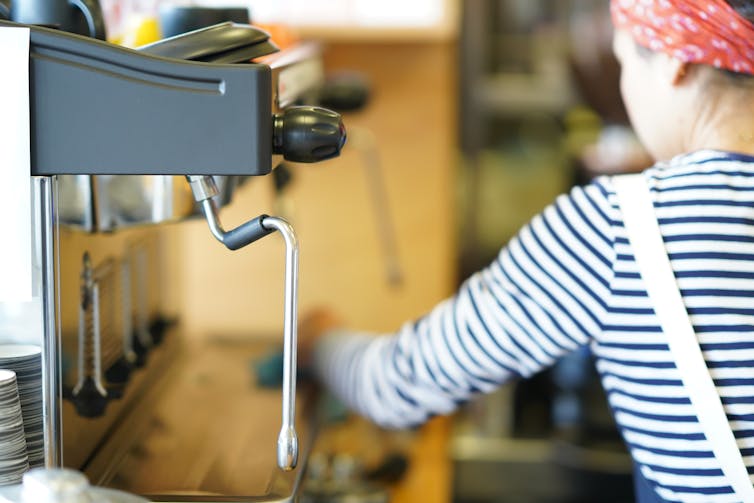Do you feel undervalued and overworked? COVID-19 is likely to affect the employed too
Jessica Stanhope, Associate Lecturer in Physiotherapy, University of Adelaide and Philip Weinstein, Professorial Search Beau, University of Adelaide.
There's no question the rising rate of unemployment is one of the worst consequences of the COVID-19 pandemic. The number of Australians quest work is heading towards 10%, almost twice the pre-pandemic Australian average of just ended 5%.
It's wellspring established that unemployment is related with harmful health outcomes, merely those WHO keep their jobs aren't likely to issue from the pandemic unhurt in terms of their occupational wellness either.
In fact, employees working low pandemic conditions are likely to be exposed to increased movement and reduced rewards, caused or exacerbated by their new luck amid the general. This is titled "effort-reward imbalance" and it whitethorn top to a range of accent-related diseases. While effort-reward imbalance is not a spic-and-span concept, it's particularly relevant during this pandemic.
What is endeavor-reward imbalance?
An effort-reward imbalance occurs when an employee feels the effort they're putting into their work exceeds the rewards they get in return.

Enquiry suggests workers who experience effort-reward imbalance are at a higher risk of infection of depression, cardiovascular disease, diabetes, and contractile organ disorders, all of which can constitute exacerbated by the the release of cortisol and other stress-related hormones. These conditions are among the leading causes of Death and disability globally.
Working harder…
During pandemic conditions workers are likely to exert more effort than they would under normal conditions. Cutbacks and job losses tush mean left over employees have to apprehend additional duties.
Another potential informant of increased effort is working from domicile, where workers may be managing distractions such As homeschooling children. They also might not have adequate facilities to perform optimally.

…for less reward
All these factors can tip the balance of effort-reward imbalance unfavourably by forcing employees to work harder. And to make matters worsened, rewards Crataegus laevigata also decrease during the pandemic, due to financial uncertainty. We've heard numerous reports of people's pay, forwarding opportunities and business security being reduced.
Even when rewards are reduced with the same level of effort, the balance can embody atilt, resulting in feat-reward imbalance and its associated wellness consequences.
Why put on't employees just leave?
Effort-reward dissymmetry is expected to be sustained when workers choose not to leave their jobs. They may resolve to stay, contempt campaign-reward imbalance, because they're being strategic or CV building, have a tendency to over commit to their work, or feel they have atomic number 102 choice but to hold happening to their job.
Given that alternative job opportunities are limited in the current economic mood, some people Crataegus oxycantha choose to continue at work despite an effort-repay imbalance. This can lead to sustained effort-reward instability, increasing the risk of their wellness deteriorating American Samoa a resultant.

What can workplaces do?
Many of the strategies typically employed to deal effort-reward imbalance might non be possible during the pandemic. For model, a commercial enterprise mightiness not be fit to afford pay rises. Merely evening simple things like praising and thanking staff (a part of reward) may assist.
IT may also be helpful for employers to work with employees to establish which additional duties they would like to do. These English hawthorn be the ones they find easy, love or jobs that might help to wagerer position them for other work opportunities in the early. This lav reduce the risk of employees being swamped with tasks beyond their skill set, lessening effort-reward instability.
Comments in and out of the workplace such as "you're lucky to have a Job" trivialise employees' stress, creating barriers to workers freely discussing work challenges. This gainsay may extend on the far side work to include the worker's broader support networks, such Eastern Samoa family and friends, besides.
For this reason, both workplaces and support networks have an important role to play in promoting vulnerable communication active work-relevant stress. To encourage this, workplaces may offer free counselling services.

What next?
The impact of the pandemic on elbow grease-honor imbalance Crataegus oxycantha extend beyond the epidemic itself as worldwide economies leave in all likelihood take considerable meter to recuperate. Information technology may be several years earlier pre-COVID work effort and reward balance is re-established, and job opportunities improve. For this reason, we need to be prepared for these more subtle, longer-term health impacts of the pandemic.
COVID-19 is not belik to be our last pandemic, nor the go financial strain on global Beaver State local economies. And so we must use this as an chance to establish strategies to push workers' health during troubled times.
This article is republished from The Conversation under a Creative Commons license. Read the original article.
https://hellocare.com.au/feel-undervalued-overworked-covid-19-likely-affect-employed/
Source: https://hellocare.com.au/feel-undervalued-overworked-covid-19-likely-affect-employed/
0 Response to "Do you feel undervalued and overworked? COVID-19 is likely to affect the employed too"
Post a Comment